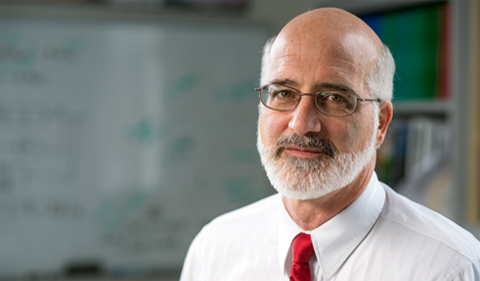
Dr. Jeffrey Vancouver
Dr. Jeffrey Vancouver, Professor Psychology, has been named the new William C. Byham Chair in Industrial/Organizational Psychology at Ohio University.
The named chair is occupied by a professor with a substantial record of publications in top I/O journals such as Personnel Psychology and the Journal of Applied Psychology in the areas of selection, appraisal, training, organizational development, or executive development. The occupant is also someone who has taught courses and mentored graduate students in these areas. Significant involvement and presentations with mainstream professional organizations—such as the Society for Industrial/Organizational Psychology or the Academy of Management—also is part of the criteria.
Vancouver’s research focuses on developing and testing computational models of human/environment interactions. These models can be simulated to create predictions of human behavior over time. The predictions are then tested against data obtained from the protocols represented in the environmental elements of the models. The models are based on control theory formulations of self-regulation. They are used to explain decision making and resource allocation (e.g., how one allocates time) when goals conflict and circumstances change. A second, related line of research focuses on the role of beliefs in goal processes (e.g., adoption, planning, striving, and revision).
Vancouver has applied this research to understanding practical issues related to selection, socialization, and training. Much of this work has focused on the motivation of learning in dynamic contexts. For example, proactive socialization refers to motivated knowledge seeking by organizational newcomers (Morrison & Vancouver, 2000; Vancouver & Morrison, 1995). It has typically been assumed to be motivated by the desire to reduce uncertainty. Yet, this theory is tested by observing the relationship between proactive seeking quantity and role clarity. Generally the relationship is positive, which is used as evidence that individuals are proactively seeking information to gain clarity (i.e., reduce uncertainty). However, lack of clarity (i.e., uncertainty) is the presumed motivator of seeking, suggesting a negative relationship.
“We (Vancouver, Tamanini, & Yoder, 2010) used a computational to illustrate the non-diagnostic value of assessing this relationship, even when the relationship is examined across time. We also showed how supervisors motivated to educate newcomers can create parallel processes, which challenges interpretations of a study that presumably disconfirmed the theory,” Vancouver says. “These findings are important because they imply organizations should continue to provide means for employees to obtain information needed to learn how to perform and work well in the organization. Moreover, it implies that organizations should provide information that allows employees to gauge their role clarity.”

William Byham
The chair is funded by a gift from Byham, an Ohio University alum who earned a B.S. in Biological Sciences and an M.S.in Psychology from the College of Arts & Sciences. He then earned a Ph.D. in Industrial/Organizational Psychology from Purdue University.
“Bill Byham is Founder and Executive Chairman of Development Dimensions International (DDI), an internationally renowned human resource training and consulting company. An Industrial/Organization Psychologist, Bill has developed many significant human resource technologies over the course of his career. These innovations include the assessment center method, behavior-based interviewing, the use of behavior-modeling in supervisor and management training, behavioral job analysis methodology as the basis for selection and training programs, and Acceleration Pools® to select and rapidly develop people for high-level leadership positions,” according to the DDI website. “These technologies have been described in 23 books and more than 300 monographs and articles. In addition, he has appeared on numerous radio and TV programs through the world.”
Ohio University’s Psychology Department offers a Ph.D. in Industrial/Organizational Psychology. The doctoral program in Industrial/Organizational Psychology provides a broad training in both industrial and organizational topics. The department’s goal is to prepare the student for both academic and applied positions, but the program emphasizes the training of scholars, with particular prominence given to research. Both independent and collaborative research projects with faculty members are required.
All Industrial/Organizational Psychology students are encouraged to get a broad I/O education, including position analysis, selection, training, performance appraisal, organizational development, and executive development built on a strong foundation of experimental design and statistics. I/O students also are encouraged to take courses in the College of Business.



















Comments